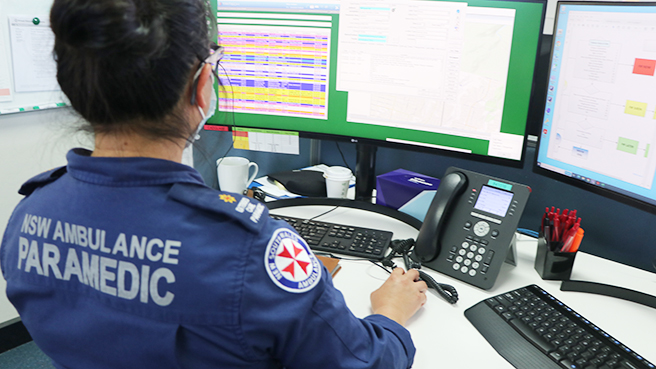
Despite the many challenges NSW Ambulance has faced over the past year, there have also been many positives. One of those is undoubtedly the Virtual Clinical Care Centre (VCCC).
The pressures of COVID-19 on our workforce meant that the VCCC commenced earlier than expected, to further assist with the growing demand for services.
VCCC Clinicians provide safe, quality and timely patient care through a comprehensive and integrated Secondary Triage and Referral service, which has assisted in the effective navigation of COVID-19 positive patients to the most appropriate care.
The COVID-19 VCCC also introduced the Clinical Support Assistant role, where a large number of graduate paramedics were rapidly onboarded to ensure that Triple Zero (000) callers were kept informed of extended response times, and to monitor patient conditions.
The VCCC celebrated its one-year anniversary in September 2022, with an awards presentation ceremony and afternoon tea held at the Gladesville site.
In reflecting – and celebrating – the VCCC’s one-year milestone, Clinical Systems Executive Director Clare Beech said the VCCC model of care is growing and maturing as we go.
“As the VCCC workforce and clinical model are developed, VCCC staff, Control Centre staff and on road clinicians can expect to see great patient and system outcomes,” Ms Beech said. “The focus remains to deliver the right care, to the right patient, by the right provider in the right time frame.”
Clinician Jannice has been with the VCCC since the start. Jannice, an Extended Care Paramedic, said it had been a “fantastic opportunity” to be a part of something that revolutionises how we manage Triple Zero (000) calls.
“It has been an exciting journey and it has been a privilege to be here since its inception to build and develop the role and to instigate different pathways for our patients,” she said. “It has been really good to assist patients and improve patient safety. On road you’re getting a lot of visual cues while speaking to patients. But via telehealth (as a VCCC clinician), where you can’t visualise them, it requires a lot more direct and specific questions.
“I’m looking forward to this role expanding to not only have more resources, but also more avenues to further improve patient safety."
Bruce, an Intensive Care Paramedic and Dispatcher from Northern Control Centre, has contributed both his clinical and Control Centre experience to the VCCC, acting in the role of Patient Tracking Clinician since its commencement.
“The journey has been very interesting for me,” he said. “It’s something new in the service and it’s one of the most rapidly growing parts of NSW Ambulance.”
Bruce felt the role of the VCCC was particularly pivotal – and in turn rewarding – at times when there was extreme demand on Triple Zero (000) calls. These key periods included the peak of COVID-19 (late last year, early this year) and also the North Coast floods (March 2022).
Associate Director of the VCCC, Hayley Turner, said that the success of the unit so far is due to the enthusiasm with which VCCC staff have taken up the challenge and adopted new skills.
“The VCCC has been blessed with a wonderful cohort of staff. Dispatchers, Extended Care Paramedics, paramedics and grads have all worked together to help develop the model to the point it is at today,” she said.
“The VCCC birthday celebration was a wonderful opportunity for us to get together and celebrate the achievements of everyone in the team over the past year.”
The VCCC is now transitioning from the temporary COVID-19 VCCC into a permanent unit, and establishing a multidisciplinary workforce under the SWIFT program.
Hayley said that an exciting element of the VCCC is that it provides a unique addition to the career pathways available for our workforce, offering a new opportunity to utilise their knowledge and experience in a way that benefits their patients and their colleagues in Control Centres and on road.
